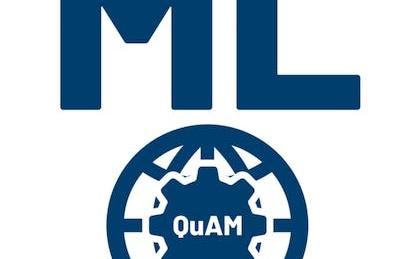

Our Courses

Introduction to Computer Science and Programming
The term “Computation” refers to the action performed by a computer. A computation can be a basic operation and it can also be a sophisticated computer simulation requiring a large amount of data and substantial resources. This course aims at introducing learners with no prior knowledge to the basic key concepts of computer science. By following the lectures and exercises of this course, you will gain an understanding of algorithms by programming using the language Ruby.
-
Course by

-
 English
English

Essentials of Genomics and Biomedical Informatics
This course presents clinicians and digital health enthusiasts with an overview of the data revolution in medicine and how to exploit it for research and in the clinic. The course will not make you a bioinformatician but will introduce the main concepts, tools, algorithms, and databases in this field.
-
Course by

-
 English
English

Data Structures & Algorithms III: AVL and 2-4 Trees, Divide and Conquer Algorithms
Learn more complex tree data structures, AVL and (2-4) trees. Investigate the balancing techniques found in both tree types. Implement these techniques in AVL operations. Explore sorting algorithms with simple iterative sorts, followed by Divide and Conquer algorithms. Use the course visualizations to understand the performance.
-
Course by

-
 Self Paced
Self Paced
-
 English
English

Data Structures & Algorithms II: Binary Trees, Heaps, SkipLists and HashMaps
Become familiar with nonlinear and hierarchical data structures. Study various tree structures: Binary Trees, BSTs and Heaps. Understand tree operations and algorithms. Learn and implement HashMaps that utilize key-value pairs to store data. Explore probabilistic data structures like SkipLists. Course tools help visualize the structures and performance.
-
Course by

-
 Self Paced
Self Paced
-
 English
English

Data Structures & Algorithms I: ArrayLists, LinkedLists, Stacks and Queues
Work with the principles of data storage in Arrays, ArrayLists & LinkedList nodes. Understand their operations and performance with visualizations. Implement low-level linear, linked data structures with recursive methods, and explore their edge cases. Extend these structures to the Abstract Data Types, Stacks, Queues and Deques.
-
Course by

-
 English
English

Computing in Python IV: Objects & Algorithms
Learn about recursion, search and sort algorithms, and object-oriented programming in Python.
-
Course by

-
 Self Paced
Self Paced
-
 English
English

Autonomous Mobile Robots
Basic concepts and algorithms for locomotion, perception, and intelligent navigation.
-
Course by

-
 Self Paced
Self Paced
-
 English
English

Linear Algebra Basics
Machine learning and data science are the most popular topics of research nowadays. They are applied in all the areas of engineering and sciences. Various machine learning tools provide a data-driven solution to various real-life problems. Basic knowledge of linear algebra is necessary to develop new algorithms for machine learning and data science. In this course, you will learn about the mathematical concepts related to linear algebra, which include vector spaces, subspaces, linear span, basis, and dimension.
-
Course by

-
 21 hours
21 hours
-
 English
English

Object-Oriented Programming in C++: Functions
This course is the third of five courses aiming to help you to become confident working in the object-oriented paradigm in the C++ language. This specialisation is for individuals who want to learn about objected oriented programming. It's an all-in-one package that will take you from the very fundamentals of C++, all the way to building a crypto-currency exchange platform. During the five courses, you will work with the instructor on a single project: a crypto-currency exchange platform.
-
Course by

-
 Self Paced
Self Paced
-
 10 hours
10 hours
-
 English
English

Biology Meets Programming: Bioinformatics for Beginners
Are you interested in learning how to program (in Python) within a scientific setting? This course will cover algorithms for solving various biological problems along with a handful of programming challenges helping you implement these algorithms in Python.
-
Course by

-
 Self Paced
Self Paced
-
 19 hours
19 hours
-
 English
English

Data Science Foundations: Data Structures and Algorithms
Building fast and highly performant data science applications requires an intimate knowledge of how data can be organized in a computer and how to efficiently perform operations such as sorting, searching, and indexing. …
-
Course by

-
 Self Paced
Self Paced
-
 English
English

Matrix Methods
Mathematical Matrix Methods lie at the root of most methods of machine learning and data analysis of tabular data. Learn the basics of Matrix Methods, including matrix-matrix multiplication, solving linear equations, orthogonality, and best least squares approximation. Discover the Singular Value Decomposition that plays a fundamental role in dimensionality reduction, Principal Component Analysis, and noise reduction. Optional examples using Python are used to illustrate the concepts and allow the learner to experiment with the algorithms.
-
Course by

-
 Self Paced
Self Paced
-
 7 hours
7 hours
-
 English
English

Prediction and Control with Function Approximation
In this course, you will learn how to solve problems with large, high-dimensional, and potentially infinite state spaces. You will see that estimating value functions can be cast as a supervised learning problem---function approximation---allowing you to build agents that carefully balance generalization and discrimination in order to maximize reward. We will begin this journey by investigating how our policy evaluation or prediction methods like Monte Carlo and TD can be extended to the function approximation setting.
-
Course by

-
 22 hours
22 hours
-
 English
English

Ethics in the Age of AI
As machine learning models begin making important decisions based on massive datasets, we need to be aware of their limitations. In this specialization, we will explore the rise of algorithms, fundamental issues of fairness and bias in machine learning, and basic concepts involved in security and privacy of machine learning projects. We'll finish with a study of 3 projects that will allow you to put your new skills into action.
-
Course by

-
 Self Paced
Self Paced
-
 English
English

Accelerated Computer Science Fundamentals
Topics covered by this Specialization include basic object-oriented programming, the analysis of asymptotic algorithmic run times, and the implementation of basic data structures including arrays, hash tables, linked lists, trees, heaps and graphs, as well as algorithms for traversals, rebalancing and shortest paths. This Specialization sequence is designed to help prospective applicants prepare for the flexible and affordable Online Master of Computer Science (MCS) and MCS in Data Science.
-
Course by

-
 Self Paced
Self Paced
-
 English
English

Java Programming and Software Engineering Fundamentals
Take your first step towards a career in software development with this introduction to Java—one of the most in-demand programming languages and the foundation of the Android operating system. Designed for beginners, this Specialization will teach you core programming concepts and equip you to write programs to solve complex problems. In addition, you will gain the foundational skills a software engineer needs to solve real-world problems, from designing algorithms to testing and debugging your programs.
-
Course by

-
 Self Paced
Self Paced
-
 English
English

Machine Learning: Algorithms in the Real World
This specialization is for professionals who have heard the buzz around machine learning and want to apply machine learning to data analysis and automation. Whether finance, medicine, engineering, business or other domains, this specialization will set you up to define, train, and maintain a successful machine learning application. After completing all four courses, you will have gone through the entire process of building a machine learning project.
-
Course by

-
 Self Paced
Self Paced
-
 English
English

Big Data Fundamentals
Learn how big data is driving organisational change and essential analytical tools and techniques, including data mining and PageRank algorithms.
-
Course by

-
 English
English

A Complete Reinforcement Learning System (Capstone)
In this final course, you will put together your knowledge from Courses 1, 2 and 3 to implement a complete RL solution to a problem. This capstone will let you see how each component---problem formulation, algorithm selection, parameter selection and representation design---fits together into a complete solution, and how to make appropriate choices when deploying RL in the real world. This project will require you to implement both the environment to stimulate your problem, and a control agent with Neural Network function approximation.
-
Course by

-
 Self Paced
Self Paced
-
 16 hours
16 hours
-
 English
English

Digital Signal Processing
This Specialization provides a full course in Digital Signal Processing, with a focus on audio processing and data transmission. You will start from the basic concepts of discrete-time signals and proceed to learn how to analyze data via the Fourier transform, how to manipulate data via digital filters and how to convert analog signals into digital format. Finally, you will also discover how to implement real-time DSP algorithms on a general-purpose microcontroller.
-
Course by

-
 Self Paced
Self Paced
-
 English
English
Informed Clinical Decision Making using Deep Learning
This specialisation is for learners with experience in programming that are interested in expanding their skills in applying deep learning in Electronic Health Records and with a focus on how to translate their models into Clinical Decision Support Systems. The main areas that would explore are: Data mining of Clinical Databases: Ethics, MIMIC III database, International Classification of Disease System and definition of common clinical outcomes.
-
Course by

-
 Self Paced
Self Paced
-
 English
English

Data Science Fundamentals
This specialization demystifies data science and familiarizes learners with key data science skills, techniques, and concepts. The course begins with foundational concepts such as analytics taxonomy, the Cross-Industry Standard Process for Data Mining, and data diagnostics, and then moves on to compare data science with classical statistical techniques.
-
Course by

-
 Self Paced
Self Paced
-
 English
English

Bioinformatics
Join Us in a Top 50 MOOC of All Time! How do we sequence and compare genomes? How do we identify the genetic basis for disease? How do we construct an evolutionary Tree of Life for all species on Earth? When you complete this Specialization, you will learn how to answer many questions in modern biology that have become inseparable from the computational approaches used to solve them.
-
Course by

-
 Self Paced
Self Paced
-
 English
English

AI Workflow: Machine Learning, Visual Recognition and NLP
This is the fourth course in the IBM AI Enterprise Workflow Certification specialization. You are STRONGLY encouraged to complete these courses in order as they are not individual independent courses, but part of a workflow where each course builds on the previous ones. Course 4 covers the next stage of the workflow, setting up models and their associated data pipelines for a hypothetical streaming media company. The first topic covers the complex topic of evaluation metrics, where you will learn best practices for a number of different metrics including regressi
-
Course by

-
 Self Paced
Self Paced
-
 14 hours
14 hours
-
 English
English

Digital Marketing and Data Driven Analytics
Digital Marketing is the backbone element which uses platforms and digital technologies, such as any kind of device to maintain connected to the users. Once the users are part of this ecosystem, the companies convert this random data in accurate algorithms to improve the effectiveness of any marketing campaign.
-
Course by

-
 Self Paced
Self Paced
-
 English
English



